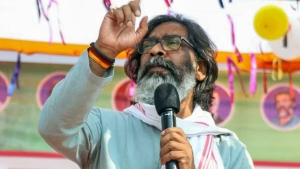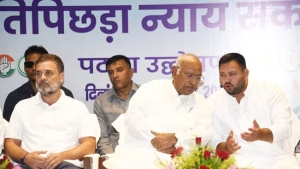Bihar – In a dramatic political turnaround, the Hemant Soren-led Jharkhand Mukti Morcha announced that it will not contest the upcoming Bihar Assembly elections, despite having declared its intention to fight independently just days earlier. This unexpected decision regarding JMM Bihar polls participation has sent shockwaves through the opposition INDIA bloc and raised serious questions about alliance cohesion ahead of crucial state elections.
The reversal on JMM Bihar polls comes merely two days after the party announced it would contest elections independently in six assembly segments, having already begun the candidate selection process and public positioning for the electoral battle in the neighboring state.
Senior Leader Announces Withdrawal Decision

Speaking to reporters, senior JMM leader and Jharkhand state tourism minister Sudivya Kumar announced the party’s withdrawal from JMM Bihar polls, citing what he termed a “political conspiracy” by alliance partners. Kumar’s statement indicated deep dissatisfaction with how the party has been treated within the INDIA bloc framework during seat-sharing negotiations.
Kumar’s announcement regarding JMM Bihar polls withdrawal was accompanied by a stern warning about reviewing alliances in Jharkhand itself, suggesting the ramifications of this decision could extend beyond Bihar and impact the political landscape in the party’s home state.
Alliance Review Threat Over Bihar Snub

The JMM’s decision to abandon JMM Bihar polls participation comes with a significant threat to existing political arrangements. Kumar stated that his party will review the alliance in Jharkhand with the Congress and Rashtriya Janata Dal, and give a befitting reply to what he characterized as a “snub” by these parties.
“The RJD and the Congress are responsible for depriving JMM from contesting the election as part of a political conspiracy. JMM will give a befitting reply to this, and review its alliance with RJD and Congress,” Kumar declared, signaling that the JMM Bihar polls controversy could have far-reaching consequences for opposition unity across multiple states.
Timeline of JMM Bihar Polls Announcements
The chaotic sequence of events surrounding JMM Bihar polls reveals serious organizational and strategic confusion within the party and the broader opposition alliance. Initially, the Hemant Soren-led party announced it would contest the elections independently in six assembly segments, suggesting confidence in going solo despite being part of a larger opposition coalition.
This independent stance on JMM Bihar polls appeared to be a calculated political decision, possibly aimed at establishing the party’s presence in Bihar and expanding its geographical footprint beyond its traditional Jharkhand stronghold.
Congress Candidate Announcements Trigger Crisis
The turning point in the JMM Bihar polls saga appears to have been the Congress party’s release of its first list of 48 candidates for the upcoming Bihar Assembly elections on Thursday. The Congress fielded its state unit chief Rajesh Ram from Kutumba seat and CLP leader Shakeel Ahmad Khan from Kadwa, apparently without adequate consultation with JMM regarding seat distribution.
Following the Congress announcement, the timeline of JMM Bihar polls declarations became increasingly erratic. On Friday, the party made a one-off announcement, fielding Rishi Mishra from Jale constituency. Then on Saturday, the party released a list of five candidates, suggesting it was still moving forward with its independent electoral strategy.
Also Read: Bihar Campaign: PM Modi’s Bold Election Push Begins October 24
Growing INDIA Bloc Coordination Problems

The withdrawal from JMM Bihar polls participation reflects growing uncertainty within the INDIA bloc over seat-sharing and coordination mechanisms. The incident highlights the challenges opposition parties face in presenting a united front against the ruling National Democratic Alliance, particularly when it comes to accommodating regional parties with overlapping geographical interests.
The mishandling of JMM Bihar polls negotiations demonstrates the fragility of opposition alliances built primarily on anti-incumbency sentiment rather than clear organizational structures and decision-making protocols. Without established mechanisms for conflict resolution, such disputes can escalate rapidly and publicly.
Implications for Jharkhand Politics
Perhaps the most serious consequence of the JMM Bihar polls controversy is Kumar’s threat to review the party’s alliance with Congress and RJD in Jharkhand. This suggestion carries significant weight, as these parties currently govern Jharkhand together, with Hemant Soren serving as Chief Minister with Congress and RJD support.
Any breakdown in this arrangement due to the JMM Bihar polls dispute could destabilize the Jharkhand government and create opportunities for the BJP-led opposition in the state. The threat appears designed to pressure Congress and RJD into making concessions or clarifications about how the JMM Bihar polls situation unfolded.
Political Conspiracy Allegations
Kumar’s characterization of the JMM Bihar polls exclusion as a “political conspiracy” by the RJD and Congress suggests the party believes it was deliberately sidelined despite being a legitimate alliance partner. This accusation points to deeper trust issues within the INDIA bloc that extend beyond simple seat-sharing arithmetic.
The allegation that Congress and RJD conspired to deprive JMM of its rightful place in JMM Bihar polls contests raises questions about whether larger parties in the alliance are willing to accommodate smaller regional partners or prefer to maintain their own dominance in specific states.
Future of Opposition Unity in Question
The collapse of JMM Bihar polls participation plans serves as a cautionary tale about the challenges facing opposition unity efforts. As Bihar prepares for crucial assembly elections, the inability of INDIA bloc partners to manage even basic coordination on candidate selection and seat distribution reveals serious organizational weaknesses.
The JMM Bihar polls controversy demonstrates that opposition parties must develop more robust mechanisms for internal negotiation and dispute resolution if they hope to present a credible alternative to the well-organized NDA. Without addressing these fundamental coordination problems, such alliances risk fragmenting at critical moments, undermining their electoral prospects and credibility with voters seeking a united opposition.

